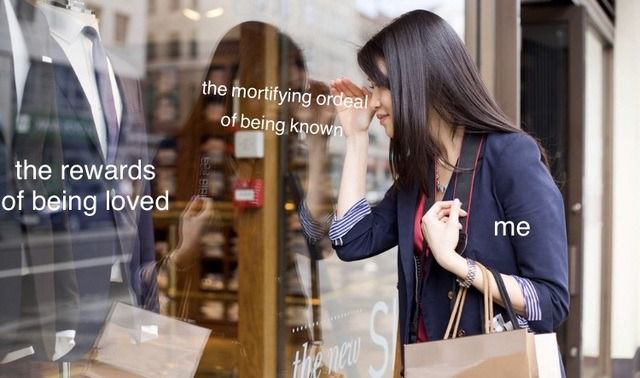One of my favorite memes is spun off a line from an essay: “if we want the rewards of being loved, we must submit to the mortifying ordeal of being known.”
The format is simpler than it sounds: on one side, being loved; on the other, being known. Sometimes the mortifying ordeal is a pane of glass or a cartoon boulder, but it’s always standing between you and being loved.
The wordiness becomes part of the joke. You can start with a simple tagline (“why don’t you have a piece of bread,” let’s say) and the twist (“why don’t you submit to the mortifying ordeal of being known”) will turn it into something sadder and harder to resolve. There’s real wisdom to the idea. Intimacy can be terrifying, and the lonelier you are, the scarier it is. It takes courage to be loved, and there’s always something harrowing about it.
![A meme, reading, “Why don’t you [submit to the mortifying ordeal of being known] and maybe you’ll [receive the rewards of being loved].”](https://bunny-wp-pullzone-ybnxlnqh92.b-cdn.net/wp-content/uploads/2019/08/the-latest-online-craze-is-submitting-to-the-mortifying-ordeal-of-being-known.jpg)
You can see why this sort of thing resonates online. Tumblr culture is usually guided by the twin lights of horniness and social anxiety, and this meme brings them together in a particularly satisfying way. Most of the riffs take the stance of a person not being loved, not being able to withstand the ordeal of being known — or failing that, stubbornly demanding to be loved without paying the price. It’s not the only way to read the phrase, but you can imagine why it resonated the most online. If you were really ready to be known, you probably wouldn’t be on Tumblr.
The line originally comes from an essay by cartoonist and writer Tim Kreider, published on The New York Times’ Opinionator blog in 2013. How it got from there to meme stardom is something of a mystery, but it probably had something to do with The Hairpin, which reblogged the essay shortly after it came out, block-quoting the “mortifying” line and borrowing it for the title. But according to Know Your Meme, the first Tumblr variations weren’t spotted online until 2018, where they’ve kept going ever since.
The essay itself, titled “I Know What You Think of Me,” is well worth reading. It starts with goats, as so much great literature does:
Recently I received an e-mail that wasn’t meant for me, but was about me. I’d been cc’d by accident … The context is that I had rented a herd of goats for reasons that aren’t relevant here and had sent out a mass e-mail with photographs of the goats attached to illustrate that a) I had goats, and b) it was good. Most of the responses I received expressed appropriate admiration and envy of my goats, but the message in question was intended not as a response to me but as an aside to some of the recipient’s co-workers, sighing over the kinds of expenditures on which I was frittering away my uncomfortable income. The word “oof” was used.

From there, Kreider walks through various concerns about existing in the minds of others and seeing yourself as an object of other people’s opinions — until he comes to the final, triumphant metaphor:
Years ago a friend of mine had a dream about a strange invention; a staircase you could descend deep underground, in which you heard recordings of all the things anyone had ever said about you, both good and bad. The catch was, you had to pass through all the worst things people had said before you could get to the highest compliments at the very bottom. There is no way I would ever make it more than two and a half steps down such a staircase, but I understand its terrible logic: if we want the rewards of being loved, we have to submit to the mortifying ordeal of being known.
What a line! As it happens, Kreider himself only found out about the essay’s second life a few weeks ago. He has a new book out — focusing on his relationships with women, fittingly enough. I spoke with him over email to get his reaction to the meme, and his advice on how to withstand the mortifying ordeal of being known.
What was your reaction when you heard your sentence had taken on this new life? Do you think the meme is true to what you meant?
A friend of mine forwarded me a meme of this line superimposed over an unhappy cat’s face. She later showed me an entry on Know Your Meme displaying additional variations. I would describe my initial reaction as nonplussed, or maybe bemused. Obviously, it’s flattering to know that you’ve written something that resonates with people, but it always does some slight violence to a writer’s intention to yank a sentence out of context. But anytime you publish something, you relinquish control of it, and people get to interpret it however they want. Maybe memes just makes this process a little more literal.
Why do you think it resonated with people?
As a writer I bank on the assumption that whatever’s true of me is likely true of everyone else, too, and to judge from my mail it seems as if a lot of what I write does express what other people are feeling. But as for why this particular line really resonated with people — who knows? It does seem like the current generation of young people have somewhat more than the usual horror of being seen, being known. Maybe it has something to do with the illusion of omniscient invisibility that the internet confers. I know younger people don’t use the phone at all anymore (by “use” I mean “talk on”), and I get the impression they have a lot of anxiety about going out into the world.

As the author, do you have any insight into the mortifying ordeal of being known that might help those of us who want to be loved?
Well, not to be all “old man yells at cloud,” but I believe that the internet is on balance a bad thing. A friend and I call it “the sad machine,” to remind ourselves what it really is and does. (It clarifies things to use that name: “Guess I’ll switch on the ol’ sad machine for a few hours, see if that cheers me up any.”) So I’d advise them to turn off their devices and go outside and play. I’m not pretending that the trade-off between love and vulnerability is an easy one for anyone at any age, but the alternative is to be the guy in Simon & Garfunkel’s “I Am A Rock.”
Last question: what’s the deal with the goats?
People rent them out to crop their lawns and control weeds. I think Prospect Park contracted with some goats a couple years ago. They eat pretty much everything, including brambles and poison ivy. They’re also very companionable animals with a lot of character. Sadly, the people who used to rent them to me have gone out of that business so I haven’t had them in several years, and my lawn’s gone to hell.
https://www.theverge.com/2019/8/4/20752123/mortifying-ordeal-timothy-kreider-tumblr-meme

